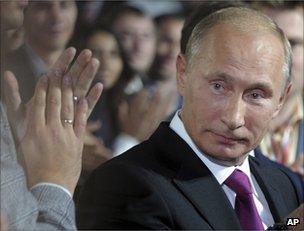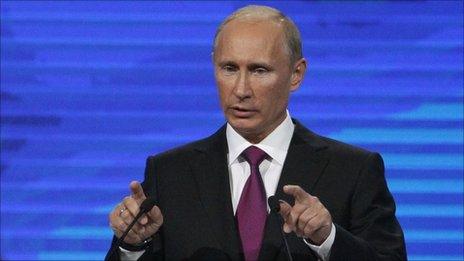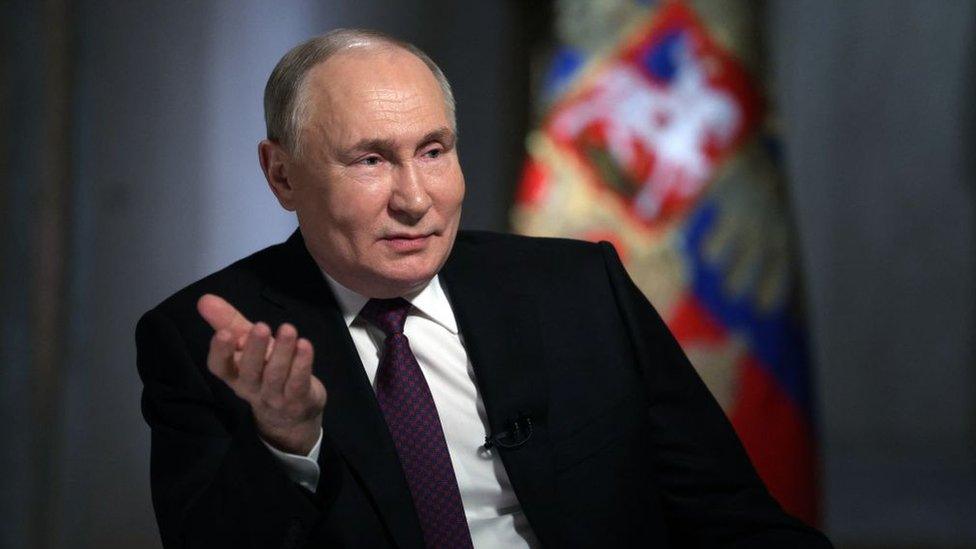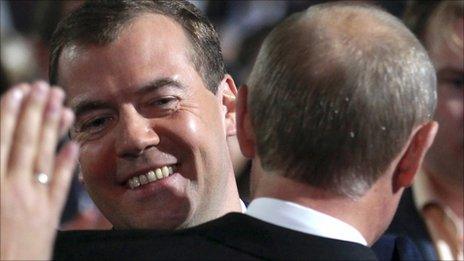Russia's Putin set to return as president in 2012
- Published

Mr Putin's formal nomination for president is seen as a foregone conclusion
Russian Prime Minister Vladimir Putin says he has accepted a proposal to stand for president in March 2012.
Addressing the ruling United Russia party's annual congress, Mr Putin and current President Dmitry Medvedev backed one another to switch roles.
The announcements end speculation over which man should run for the top job.
United Russia, which Mr Putin leads, dominates the country's politics and observers say his return to the Kremlin is now all but guaranteed.
He had already served two terms as president before Mr Medvedev took over in 2008. Mr Putin was barred by the constitution from running for a third consecutive term.
News of Mr Putin's candidacy, which had been widely expected, was greeted with dismay by the country's small liberal opposition.
Boris Nemtsov, a deputy prime minister under Boris Yeltsin, likened Mr Putin to Alexander Lukashenko, the long-serving autocratic president of Belarus.
'Great honour'
"I want to thank you for the positive reaction to the proposal for me to stand for Russian president," Mr Putin told delegates after Mr Medvedev suggested he should be a candidate.
"For me this is a great honour."
Mr Putin also indicated that Mr Medvedev could become prime minister following the 4 December parliamentary vote, introducing a "new, effective, young, energetic management team".
Mr Medvedev had earlier accepted a proposal that he head the party's list of candidates in the elections and spoke of his "readiness to assume practical work in the government" in the future.
Backing Mr Putin for president, he said: "I think it would be correct for the congress to support the candidacy of the party chairman, Vladimir Putin, to the post of president of the country."
The congress must formally nominate Mr Putin as its presidential candidate - but that appears all but certain given the cheering and applause that greeted Mr Medvedev's proposal.
There have been months of speculation that Mr Putin planned to return to the Kremlin when elections are held in March.
Correspondents say most Russians believe he has greater influence in the country and far more power than Mr Medvedev.
Mr Putin told delegates that the two men had reached agreement on who should hold which post "a long time ago, several years back".
He also warned of possible, unpopular measures to cope with the global financial turmoil.
"The task of the government is not only to pour honey into a cup, but sometimes to give bitter medicine," Mr Putin said.
"But this should always be done openly and honestly, and then the overwhelming majority of people will understand their government."
Mr Medvedev has spearheaded a drive to modernise Russia during his term in office.
Some economists say the return of the more conservative Mr Putin could counter this. Others say the two men vary in their styles but differ little on policy.
Mr Putin has already served two terms as president before Mr Medvedev took over in 2008
Under recent constitutional amendments, the new president will have a six-year mandate rather than four years as before. He or she will be able to serve no more than two consecutive terms, meaning Mr Putin could be in office until 2024.
Mr Nemtsov, who co-founded the unregistered People's Freedom Party, predicted "increased migration, capital flight and even more dependence on raw materials" under Mr Putin.
"We're in for a giant corruption component in politics, which will be incomparable with the current one," he told Russian radio station Ekho Moskvy.
Strange tweets
News of the candidacy generated a wave of Russian-language traffic on Twitter, much of it enthusiastic, such as a tweet by @xurinlev which read, "The man who pulled Russia out of the crash is coming back!"
However, along with genuine messages of support, a #putin2012 hashtag appeared which raised suspicions of manipulation among bloggers.
It was being promoted, in part, by tweeters who had registered on Twitter on the same date, 27 June 2011, some within seconds of each other, with account locations that spanned Russia.
"It's very easy to tell real public opinion from fake," tweeted @samklebanov after noticing the pattern. "Compare searches for "Putin" in Twitter with searches for #putin2012."
Meanwhile, one of the country's most popular micro-bloggers, @navalny, quipped "Android replacing iPod", seeming to refer to Mr Putin's strongman image and Mr Medvedev's well-known enthusiasm for social media.
"What happened to Mr Medevedev?" joked another tweeter, @ivan_f_davydov. "He drowned in the ovation."
The Russian president, who on Wednesday had tweeted "Half a million - that's cool. Thanks!", in apparent reference to the number of followers of his @MedvedevRussia account, did not tweet on Saturday.
- Published24 September 2011

- Published17 March 2024

- Published24 September 2011
